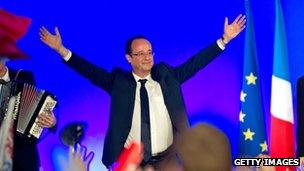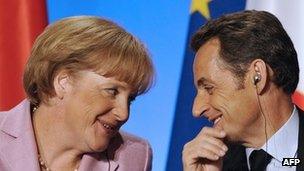Euro crisis: Can Merkel and Hollande find compromise?
- Published
- comments

Francois Hollande made opposition to austerity a major theme of his campaign
The relationship between France and Germany has been the backbone of Europe since World War II.
Helmut Kohl and Francois Mitterrand had famously held hands as they recalled the waste of lives at the Battle of Verdun.
"Europe cannot move ahead without the Franco-German engine," said former French President Valery Giscard d'Estaing.
General de Gaulle had described Germany as the horse and France the jockey. President Nicolas Sarkozy described the two countries as "opposite twins".
Never have the leaders of France and Germany been so important to the future of Europe as now - with the eurozone crisis drifting dangerously.
Hours after being sworn in as French president, Francois Hollande will fly to Berlin for dinner with Chancellor Angela Merkel. She has said she will welcome him "with open arms".
Harsh lessons
But her embrace will hide some embarrassment. She had openly backed President Sarkozy during the French election and nearly campaigned for him.
In Berlin there is suspicion of Mr Hollande. They do not like the fact that during the campaign he raised the standard against austerity and championed growth. Many saw that as a bid to reclaim French leadership in Europe.
Politically they come from different sides of the tracks.
Chancellor Merkel, who grew up in former communist East Germany, is mindful of German history and the lessons from the Weimar Republic - that inflation left unchecked could destroy democracy.
She has praised the wisdom of the Swabian housewife, a model southern German citizen, famed for frugality and thrift. Her instinctive attitude to the Greeks and others was that they had to be taught a lesson, that they needed to live within their means.
Former Greek Prime Minister George Papandreou had pleaded with Angela Merkel for easier terms for the first bailout loan.
She had replied: "We want to make sure nobody else will want this." The bailout terms were intended as a harsh lesson to others.
'Tax and spend socialist'
Mr Hollande is a socialist who cut his political teeth during the presidency of Francois Mitterrand.

German Chancellor Angela Merkel had openly backed Nicolas Sarkozy's bid for a second term
His keenest instinct is to preserve the French way of life, with its social welfare model. During his campaign he promised to raise the minimum wage, hire tens of thousands of new teachers and water down the retirement age.
Politically she regards him as a tax-and-spend socialist.
Their most critical division is over austerity. Francois Hollande does not believe the policy is working.
"Austerity can no longer be the only option," he said. During the campaign he pledged to renegotiate the so-called "stability pact" aimed at enforcing discipline in the eurozone.
For Chancellor Merkel this pact is the key to the future survival of the single currency. She has repeatedly stated it is "not open to new negotiations".
Mr Hollande shot back, saying "it is not for Germany to decide for the rest of Europe".
The view in Berlin is that the new French president did not level with his audiences. Privately they made it clear that there could be no renegotiation. They believe that Mr Hollande understands that.
Compromise?
They have not, however, been encouraged by remarks from the Socialist Party spokesman Benoit Hamon, who told French television: "We did not vote for there to be a president of the European Union named Mrs Merkel, who decides on the fate of all the others."
Politically they understand it will be difficult for Mr Hollande to back away from his pledge to renegotiate the pact - at least until after the parliamentary elections in June.
Officials then expect some compromise.
Chancellor Merkel will accept a growth commitment to be attached to the stability pact. She will be prepared to see EU funds diverted to major infrastructure projects and to see the capital base of the European Investment Bank expanded.
What she will not compromise on is her opposition to growth being financed through borrowing.
Some of these discussions will be tense and difficult. Mrs Merkel, for instance, will oppose the European Central Bank being able to lend directly to governments.
One of the first questions that will be put to the new French leader is where he stands on Greece. Does he go along with the German government in insisting that Greece accept the terms of the bailout deal if it is to stay in the eurozone?
Or does he believe that there will have to be some easing of the terms through a renegotiation? That decision may have to be taken within weeks.
Mr Hollande also appears to want France and Germany to be less dominant.
"The Franco-German relationship has been exclusive," he said. "European institutions have been neglected and some countries, notably the more fragile ones, have had the unpleasant feeling of facing an executive board."
The Germans are anxious the new French president may compete for allies within the EU.
The key for Berlin is that Mr Hollande sticks to his promise to balance the budget by 2017 and to bring the French deficit down to 3% by next year.
Reality, officials in Berlin say, will give the French president very little room for manoeuvre.
Whatever their differences, the crisis in the eurozone will put them under huge pressure to compromise.
After all, Chancellor Merkel and Nicolas Sarkozy did not like each other at first but ended up being called "Merkozy" - such was their closeness.